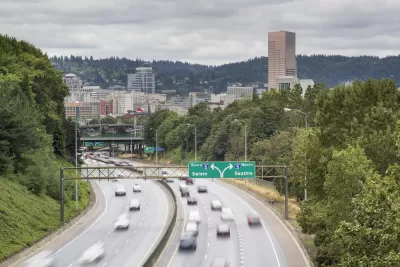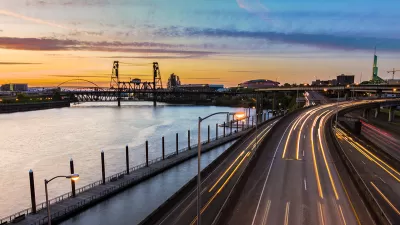It's back to the drawing board for the I-5 Rose Quarter Improvement Project.

The Oregon Department of Transportation (ODOT) will have to again review the environmental impacts of a proposed freeway widening project on Interstate 5 in the Rose Quarter near Downtown Portland, reports Jayati Ramakrishnan for The Oregonian.
"In a letter to ODOT, made public by the climate activist group No More Freeways, Federal Highway Administration administrator Phillip Ditzler said he rescinded his approval of the environmental assessment because of modifications ODOT made to the I-5 freeway project since he approved the findings in 2020," according to Ramakrishnan.
The modifications in question are a freeway cap:
Those modifications include a freeway cover that would reconnect several blocks in the Albina neighborhood, a historically Black community that was partially razed in the 1960s to build I-5. That plan was approved by the Oregon Transportation Commission in September following a long disagreement between ODOT and local entities, including the community nonprofit Albina Vision Trust, as well as the city and Multnomah County. Those groups had said ODOT’s original plan for freeway covers was inadequate.
The I-5 Rose Quarter Improvement Project, as the freeway widening proposal is called, has been a poster child for the highway widening status quo in recent years, attracting focused criticism after ODOT released an environmental impact assessment in February 2019 that promised the project would deliver air quality and traffic safety improvements.
The source article includes insight into the decision by the Federal Highway Administration and potential next steps for local groups fighting the project.
FULL STORY: ODOT must redo environmental study for Rose Quarter freeway project after feds rescind approval

Alabama: Trump Terminates Settlements for Black Communities Harmed By Raw Sewage
Trump deemed the landmark civil rights agreement “illegal DEI and environmental justice policy.”

Planetizen Federal Action Tracker
A weekly monitor of how Trump’s orders and actions are impacting planners and planning in America.

How Atlanta Built 7,000 Housing Units in 3 Years
The city’s comprehensive, neighborhood-focused housing strategy focuses on identifying properties and land that can be repurposed for housing and encouraging development in underserved neighborhoods.

In Both Crashes and Crime, Public Transportation is Far Safer than Driving
Contrary to popular assumptions, public transportation has far lower crash and crime rates than automobile travel. For safer communities, improve and encourage transit travel.

Report: Zoning Reforms Should Complement Nashville’s Ambitious Transit Plan
Without reform, restrictive zoning codes will limit the impact of the city’s planned transit expansion and could exclude some of the residents who depend on transit the most.

Judge Orders Release of Frozen IRA, IIJA Funding
The decision is a victory for environmental groups who charged that freezing funds for critical infrastructure and disaster response programs caused “real and irreparable harm” to communities.
Urban Design for Planners 1: Software Tools
This six-course series explores essential urban design concepts using open source software and equips planners with the tools they need to participate fully in the urban design process.
Planning for Universal Design
Learn the tools for implementing Universal Design in planning regulations.
Jessamine County Fiscal Court
Caltrans
Institute for Housing and Urban Development Studies (IHS)
City of Grandview
Harvard GSD Executive Education
Toledo-Lucas County Plan Commissions
Salt Lake City
NYU Wagner Graduate School of Public Service



























